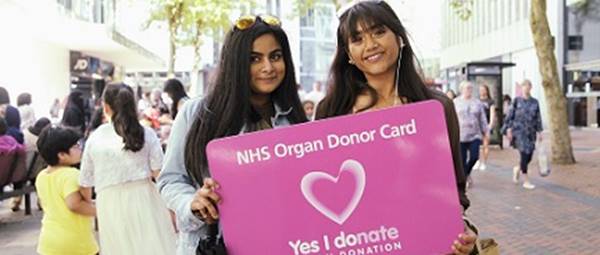Schools are now teaching young people how to donate and save lives
All secondary school children in England are now being taught how to save lives through donation. Teaching about blood, organ and stem cell donation is now part of the national curriculum for the first time.
 As pupils head back to school, learning about donation will be part of their lessons this academic year. It is hoped young people will consider becoming donors and drive donation conversations at home, to help patients relying on life-saving gifts.
As pupils head back to school, learning about donation will be part of their lessons this academic year. It is hoped young people will consider becoming donors and drive donation conversations at home, to help patients relying on life-saving gifts.
NHS Blood and Transplant (NHSBT) needs to collect around 1.4 million blood donations a year in England to help hospital patients of all ages.
Thousands of people are waiting for an organ transplant in the UK, including hundreds of children.
Stem cells can be used to treat a wide range of blood cancers and disorders and more than 400 UK patients a year, including children, can’t have this potentially life-saving treatment because they lack a suitable donor.
Alex Cullen, Head of Marketing at NHSBT, says: “We’re delighted that donation is now part of the national curriculum, young people can make such a difference, by donating but also by talking to their family and friends about donation and encouraging others to become lifesavers.
“We see considering the types of donation as a rite of passage to becoming an adult, these lessons will allow pupils to discuss donation and empower them to make their own informed decision.
“If young people support donation after learning about it, we know they can be hugely influential and can help advocate for us and ultimately help us save more lives.
“We’re excited to be working with teachers to educate 11 to 16 year-olds about donation and would encourage teachers to check out our free resources to help them with these lessons.
“We know young people can save lives too but also inspire others around to think about the gifts they can give.”
You can become a blood donor and stem cell donor via NHSBT at the age of 17, if you meet certain criteria (1).
Anyone can share their organ donation wishes with their family at any time and join the NHS Organ Donor Register at any age. It is important to tell your family whatever your organ donation decision is, so that they can support it.
Free resources to help teachers educate secondary school students about the different kinds of donation and the difference they make, are available now online.
They are Personal, Social, Health and Economic (PSHE) education Association Quality Assured Resources (2) and have been developed by NHSBT in collaboration with the blood cancer charity Anthony Nolan and with the support of practising teachers.
Terence Lovell, Chief Engagement and Marketing Officer at Anthony Nolan, said: “Every day, our schools and universities programmes make young people aware of their lifesaving potential and encourage them to make an informed choice about joining the stem cell donor register.
“We are delighted to have collaborated with NHS Blood and Transplant to produce these teaching resources, which will provide young people with an introduction to altruistic donation and enable them to start important conversations with their families and friends.
“Without incredible young donors, Anthony Nolan simply couldn’t keep saving lives.”
The resources can be used on their own or combined and include lots of notes so teacher preparation is minimal.
There are optional extra activities and schools can request a speaker, many of whom have personal connections to donation, to present at a school assembly (see the assembly section of the resource pages).
The new free lessons compliment those already available and there is a range of additional free resources and initiatives developed by NHSBT’s charity partners to educate five to 18-year-olds about blood, stem cell and organ donation.
Access these additional free resources
NHSBT would like to thank all those who have helped with the education resources, especially Anthony Nolan, Team Margot, Asset, EVERFI (EdComs), the PSHE Association and the Department for Education.
More information
Find out more about organ donation and how to register your decision. Whatever you decide, please remember to tell your loved ones your decision.
To find out more about becoming a blood donor visit our Give Blood website.
To find out more about becoming a stem cell donor on the British Bone Marrow Registry website or through the Anthony Nolan charity.
Article notes
- Find out more about who can give blood
- The PSHE lessons and guidance document have received the PSHE Association Quality Assured Resources mark, this does not include the science lesson.

